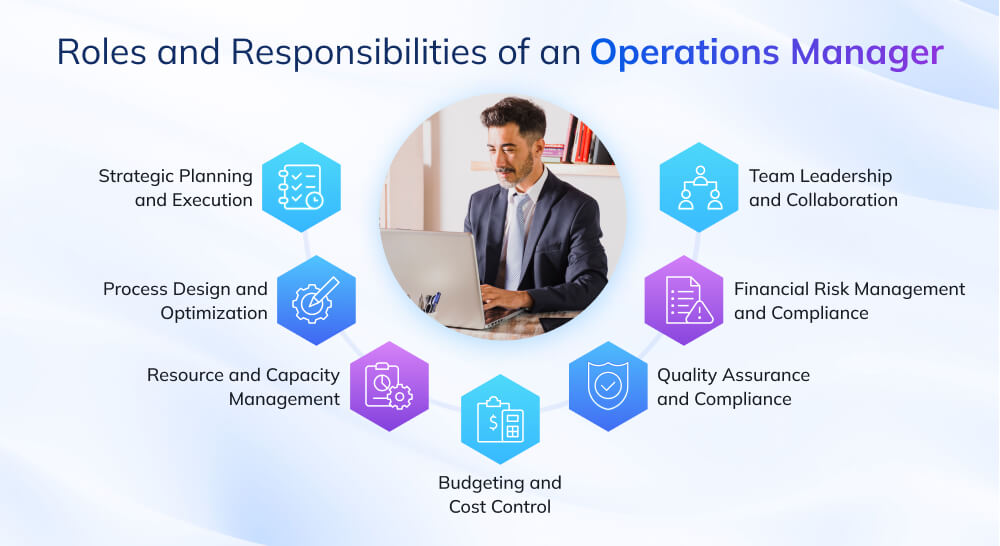
In 2026, what makes a company truly efficient? Is it the visionary leadership, innovative technology, or flawless execution?. In reality, it’s the Operations Manager who ensures all three work together. In every industry, they’re the ones making sure things get done right on time, on budget, and without chaos.
However, this role has undergone significant changes in recent years. It’s no longer about just managing daily workflows or approving purchase orders. As businesses grow more global and operations managers now lead transformation in their company and shape strategy.
Therefore, companies are looking for newly skilled operations managers. Here’s a number that puts this in perspective: projected job growth rate for operations managers is 6% from 2018 to 2028, with about 189,200 new jobs expected in the next decade.
So, if you’re someone exploring this career path or simply trying to understand what makes operations management so important, this article is for you. We’ll walk through the core roles and responsibilities of an operations manager and the skills you’ll need.
Why Companies Need the Operations Manager Role in 2026?
Before we understand the roles and responsibilities of an Operations Manager, let’s understand why this role is so important. Consider a mid-sized manufacturing company scaling its operations to meet rising demand. Although their sales are strong, production delays, supply issues, and communication gaps between departments are creating chaos. This is where an Operations Manager makes all the difference. They align teams, streamline processes, and ensure the company delivers on time and within budget.
Due to its close similarity with project management, many still wonder, “Is operations management really any different?”
When comparing project Management to operations Management, the difference becomes clear: project managers drive short-term goals and defined outcomes, while operations managers sustain long-term efficiency and organizational stability. Here’s why the role is important :
| Key Function | What It Means for the Business |
| Ensures alignment between strategy and execution | Translates leadership goals into actionable, measurable operational plans. |
| Optimizes resources and costs | Identifies inefficiencies, boosts productivity, and reduces waste through smarter process design. |
| Builds resilience and adaptability | Keeps operations steady amid disruptions from supply chain issues to market volatility. |
| Drives continuous improvement | Uses data and technology to automate, innovate, and evolve business operations over time. |
7 Core Roles and Responsibilities of an Operations Manager
Now that we’ve understood why the role of an Operations Manager matters, let’s understand what an OM (Operations Manager) actually does. Their responsibilities go far beyond day-to-day supervision; they’re at the center of process efficiency, team performance, and strategic execution. Let’s explore each of these core duties one by one.
1. Strategic Planning and Execution
An Operations Manager helps shape the business’s direction. They take broad company goals and turn them into practical plans.
For instance, say a retail brand plans to expand into three new cities next year. The leadership team defines the goal, but it’s the Operations Manager who figures out how to make it happen.
This often means thinking like a strategist and acting like a problem-solver. Rather than simply following what’s planned, Operations Managers look for gaps, suggest improvements, and refine how work gets done. They bring a fresh perspective to everyday challenges, making operations smarter and more sustainable.
To do this effectively, many OMs rely on strategies like Lean Management. By aligning people, technology, and resources around common goals, they ensure that execution supports long-term growth, not just daily targets.
In the process, they continuously identify strategies to improve business operations from simplifying workflows to adopting smarter tools helping the organization perform better every quarter.
Many OMs adopt frameworks such as Lean Management or OKR (Objectives and Key Results) methodologies to maintain alignment across teams. These approaches help ensure that execution isn’t just about hitting short-term targets, but about sustaining long-term growth and operational resilience.
Success in this area is often tracked using key performance indicators (KPIs) such as:
|
2. Process Design and Optimization
This is one of the most critical responsibilities of an Operations Manager. It’s about ensuring that every business process from production to delivery runs as efficiently and consistently as possible. A well-designed process not only saves time and cost but also enhances quality and customer satisfaction.
Key aspects include:
|
In short, process design and optimization help transform operations from being reactive to being proactive, where every step adds measurable value.
3. Resource and Capacity Management
Managing resources is about more than just counting what’s available; it’s about predicting needs, preventing waste, and maintaining balance across the organization. Operations Managers use a mix of planning tools, forecasting models, and optimization techniques to make this happen. Here’s how they typically manage it:
- Demand forecasting: Using data analytics and tools like MRP (Material Requirements Planning) or ERP systems to anticipate workload and resource needs.
- Workforce scheduling: Applying capacity planning models or shift optimization tools to align manpower with production goals.
- Inventory management: Leveraging Just-in-Time (JIT) or ABC analysis to minimize holding costs and reduce stockouts.
- Asset utilization: Monitoring equipment efficiency using OEE (Overall Equipment Effectiveness) metrics and preventive maintenance schedules.
- Scenario planning: Preparing for demand fluctuations or disruptions through simulation and “what-if” analysis.
Ultimately, all these efforts aim to achieve cost reduction in business processes by optimizing resource utilization, streamlining processes, and minimizing inefficiencies.
4. Budgeting and Cost Control
One of the most important responsibilities of an Operations Manager is keeping financial performance on track. They manage budgets and ensure every rupee or dollar spent contributes directly to efficiency, output, and customer value.
Take the retail sector, for instance. An Operations Manager might notice rising store expenses due to inefficient inventory turnover and high logistics costs. To fix this, they could implement retail inventory management software to gain better visibility into sales patterns, automate reordering, and reduce carrying costs.
Beyond software and dashboards, Operations Managers rely on analytical and financial control mechanisms to drive sustainable cost management:
- Variance Analysis (Price/Volume/Mix): Helps identify whether budget deviations arise from higher material prices, lower volumes, or product mix changes, enabling targeted corrective actions.
- Should-Cost Modeling: Provides a benchmark for what a product, service, or process should cost, allowing better negotiations with vendors and informed procurement decisions.
- Purchase Price Variance (PPV): Tracks differences between actual and standard costs to highlight supplier inefficiencies or pricing anomalies.
- Spend Cubes: Offer multidimensional insights into spending patterns across categories, suppliers, and time periods, helping uncover hidden savings opportunities.
- S&OP (Sales and Operations Planning) Alignment: Ensures that financial plans align with demand forecasts, production capacity, and supply chain realities, preventing overproduction or underutilization of resources.
In addition to these tools, Operations Managers employ techniques like zero-based budgeting and cost-benefit analysis to justify every expense and promote financial accountability across departments. Regular variance reports, vendor audits, and spend analyses keep costs in check and enable continuous improvement in financial performance.
5. Quality Assurance and Compliance
Delivering consistent quality is what separates a well-run operation from an average one. Operations Managers are responsible for ensuring that every product or service meets both company standards and regulatory requirements.
In a manufacturing setup, for example, this means monitoring production lines, enforcing Standard Operating Procedures (SOPs), and using tools like Statistical Process Control (SPC) to catch defects early. They might also implement ISO 9001 quality management systems to create a culture of accountability and continuous improvement.
On the compliance side, they stay up to date on industry regulations, whether safety standards, environmental policies, or labor laws – to ensure operations run smoothly without legal setbacks. Ultimately, the goal isn’t just to meet standards, but to build trust through consistency, ensuring customers get the same high-quality experience every time.
6. Financial Risk Management and Compliance
Even the best-run operations face financial uncertainties. That’s where financial risk management becomes a crucial part of an Operations Manager’s role. They manage day-to-day costs and anticipate financial risks, strengthen internal controls, and ensure that every process supports the company’s long-term stability.
Typically, the steps in the risk management process involve identifying potential risks, assessing their likelihood and impact, prioritizing them, and putting preventive measures in place. But it doesn’t end there, continuous monitoring and refinement keep the organization prepared for new challenges.
Moreover, to stay compliant and avoid costly penalties, operations managers ensure adherence to standards like ISO 9001, GDPR, or OSHA. This balance of foresight, compliance, and adaptability helps businesses stay financially resilient, even when markets fluctuate.
7. Team Leadership and Collaboration
Operations management is as much about people as it is about processes. Even the most efficient system will fall apart without a motivated, well-aligned team behind it. That’s why strong leadership and collaboration skills are essential for every Operations Manager.
They’re not just supervisors, they’re connectors. Operations Managers coordinate between departments, resolve roadblocks, and ensure that everyone from finance to frontline staff is working toward the same objective. Here’s what effective leadership looks like in this role:
| Aspect | How Operations Managers Lead | Impact on Organization |
| Communication | Encourage open dialogue, share updates transparently, and bridge gaps between teams. | Builds trust and reduces misunderstandings. |
| Motivation & Engagement | Recognize employee efforts, set achievable goals, and promote accountability. | Boosts morale and retention rates. |
| Conflict Resolution | Address disagreements early using mediation and empathy-based approaches. | Prevents disruptions and maintains team harmony. |
| Cross-Functional Collaboration | Work closely with other departments (HR, Finance, Marketing, etc.) to align resources and timelines. | Improves overall coordination and project success. |
| Adaptive Leadership | Apply frameworks like Situational Leadership or Servant Leadership depending on team needs. | Enhances team performance and builds long-term capability. |
Strong Operations Managers also act as change leaders, guiding teams through organizational transformation. They often apply structured Change Management frameworks like ADKAR (Awareness, Desire, Knowledge, Ability, Reinforcement) to help employees understand the why behind changes, build buy-in, and sustain adoption of new processes or technologies.
Equally important is establishing a clear meeting cadence to keep communication consistent and proactive.
- Daily stand-ups help teams quickly review priorities and address roadblocks.
- Weekly operations reviews track progress on KPIs, process health, and team metrics.
- Monthly business reviews align department-level performance with strategic goals, ensuring transparency across leadership levels.
Case Study: Transforming a Capable Manager into a Strategic Farm LeaderA large family-run grain farm faced a common challenge they already had a reliable Operations Manager who knew the day-to-day work inside out but lacked the strategic direction and leadership structure needed to take the business further. The owners recognized his potential but didn’t have a clear roadmap to help him grow into a top-performing leader. To solve this, they enrolled him in the UnCommon Farms Operations Manager Program, a hands-on development initiative designed specifically for agricultural operations. The program combined on-farm workshops, one-on-one coaching, and peer benchmarking to expose participants to proven efficiency and management practices. Key improvements achieved:
The results were transformative. With sharper focus, better systems, and more accountability, the farm saw measurable operational gains and smoother leadership transitions. As the owners shared, “We had the right person in the role but no roadmap for growth. The program gave him the tools to lead with confidence and focus and that changed everything.” |
How to Prepare for the Role of an Operations Manager in 2026
The job of an Operations Manager isn’t what it used to be. With AI, automation, and data analytics changing how businesses operate, the role has grown far beyond managing workflows and people.
Today, it’s about driving change and keeping teams agile in a fast-moving world. So, if you’re getting ready for this role or planning to move up to it, here’s what you need to know to stay ahead in 2026.
- Understand how tech shapes operations: Get comfortable with tools like ERP systems, data dashboards, and AI-driven analytics. These aren’t just add-ons anymore; they define how decisions are made.
- Learn the language of strategy: Go beyond execution. Understand how operational goals connect to revenue, customer experience, and business growth.
- Get hands-on with Lean and Six Sigma principles: You don’t need to be certified right away, but knowing how to spot waste, improve workflows, and measure efficiency will set you apart.
- Build strong people skills: Operations leaders succeed through teamwork. Focus on communication, delegation, and motivating people under pressure.
- Develop financial awareness: You’ll often be asked to justify costs, manage budgets, and find savings. A solid grasp of financial risk management goes a long way.
- Stay curious and adaptable: The tools and systems you use today might change tomorrow. Keep learning through certifications, corporate training, online courses, or just staying tuned to industry trends.
Conclusion
With automation, AI, and data-driven decision-making becoming mainstream, the scope of Operations Manager roles and responsibilities is shifting from traditional process control to strategic orchestration. Tasks that once required manual oversight like scheduling, reporting, or forecasting are now being automated through intelligent ERP systems, predictive analytics, and workflow automation tools.
However, technology is not replacing Operations Managers; it’s redefining their influence. The next-generation Operations Manager will be part strategist, part technologist, and part change agent, guiding teams through digital transformation while ensuring efficiency, compliance, and performance excellence.
Looking ahead, we’ll also see a growing focus on sustainability and resilience. Future-ready operations will aim not just to cut costs, but to reduce waste, ensure ethical sourcing, and build supply chains that can withstand disruption.
Shortly, the operations manager in 2026 and beyond will be less of a task executor and more of a value creator, connecting data, people, and strategy to help businesses thrive in an unpredictable world.
If you’re ready to elevate your career in operations and take on greater leadership responsibilities, Invensis Learning can help you make that leap. Our certification programs are designed to help professionals master key Operations Manager roles and responsibilities, from process optimization to strategic planning and performance improvement.
Gain the practical tools, frameworks, and confidence to lead with impact in today’s fast-changing business environment.
Start your journey with Invensis Learning, build the skills to become a future-ready Operations Manager today.
Frequently Asked Questions
1. What qualifications do you need to become an Operations Manager?
Most operations managers hold a degree in business administration, management, or a related field. However, employers now prefer candidates with additional certifications in areas like Lean Six Sigma, project management (PMP), or operations analytics to handle complex, data-driven environments.
2. How is AI changing the role of Operations Managers?
AI tools are automating repetitive tasks such as forecasting, inventory tracking, and process optimization. This shift allows operations managers to focus more on strategic planning, innovation, and decision-making, rather than daily supervision.
3. What’s the difference between Operations Management and Project Management?
While both involve planning and execution, operations management focuses on ongoing business processes, whereas project management handles temporary, goal-specific initiatives. Operations managers ensure continuous efficiency, while project managers deliver defined outcomes within a set timeframe.
4. Which industries have the highest demand for Operations Managers in 2026?
Industries like manufacturing, e-commerce, logistics, and healthcare are actively hiring operations managers to handle supply chain optimization, process automation, and performance tracking amid digital transformation.
5. How can professionals grow into senior leadership from an Operations Manager role?
To move up, focus on strategic thinking, financial literacy, and digital transformation skills. Many operations managers advance to roles like Director of Operations, COO, or Business Transformation Head after gaining experience in cross-functional leadership and innovation management.

















